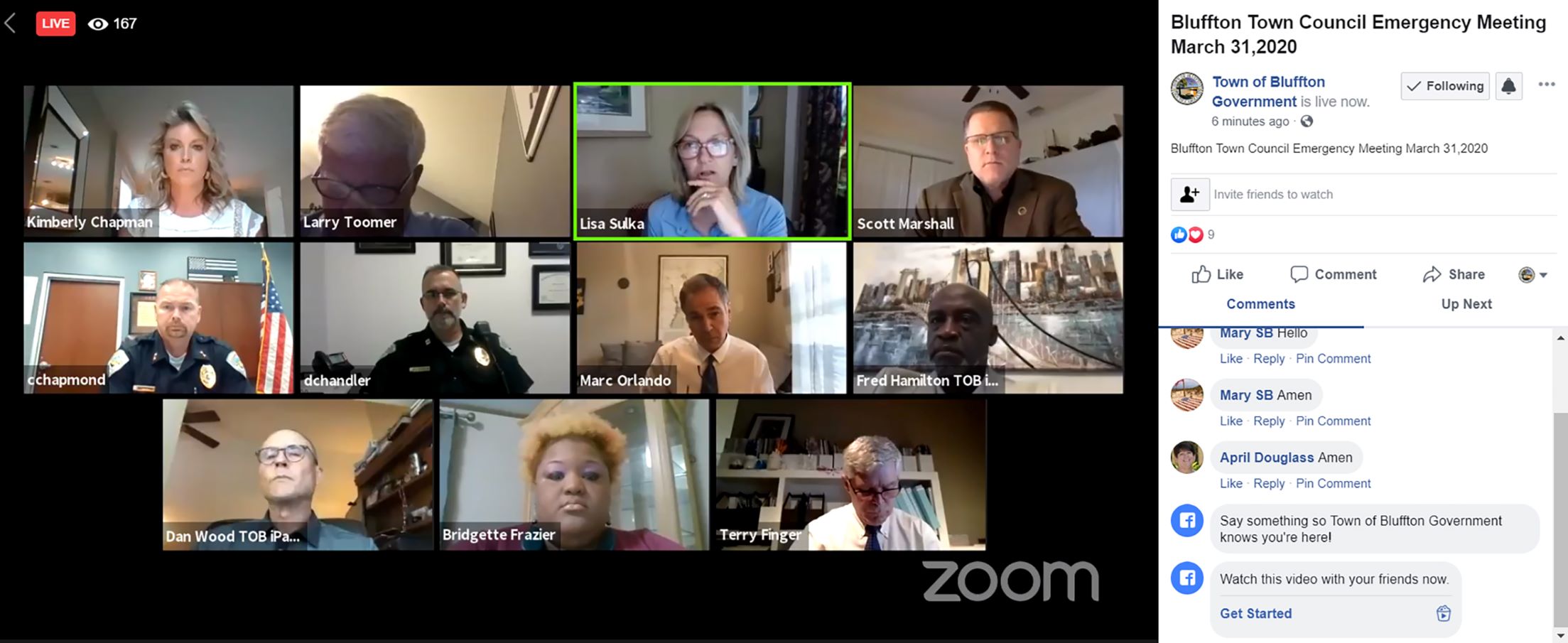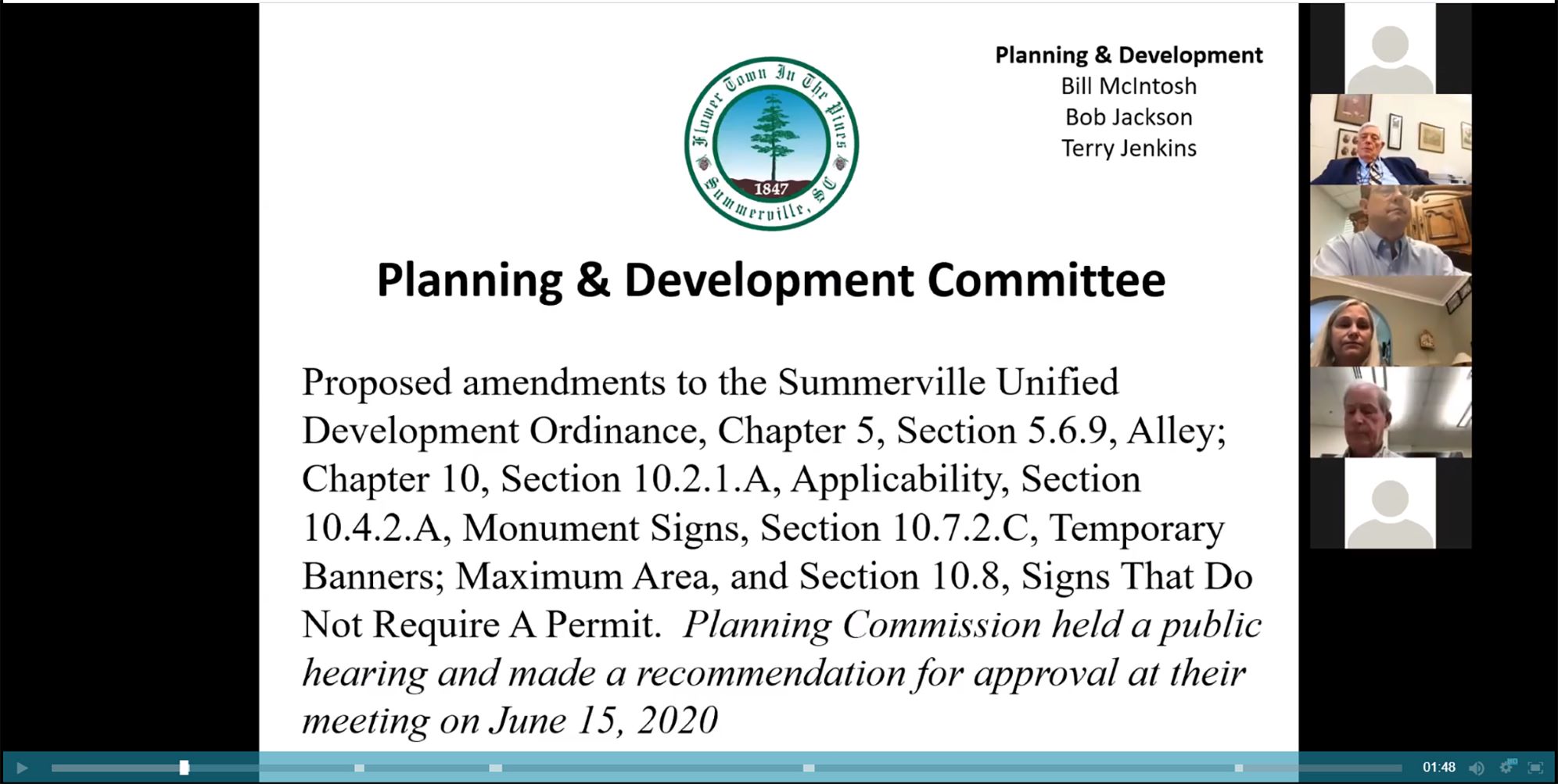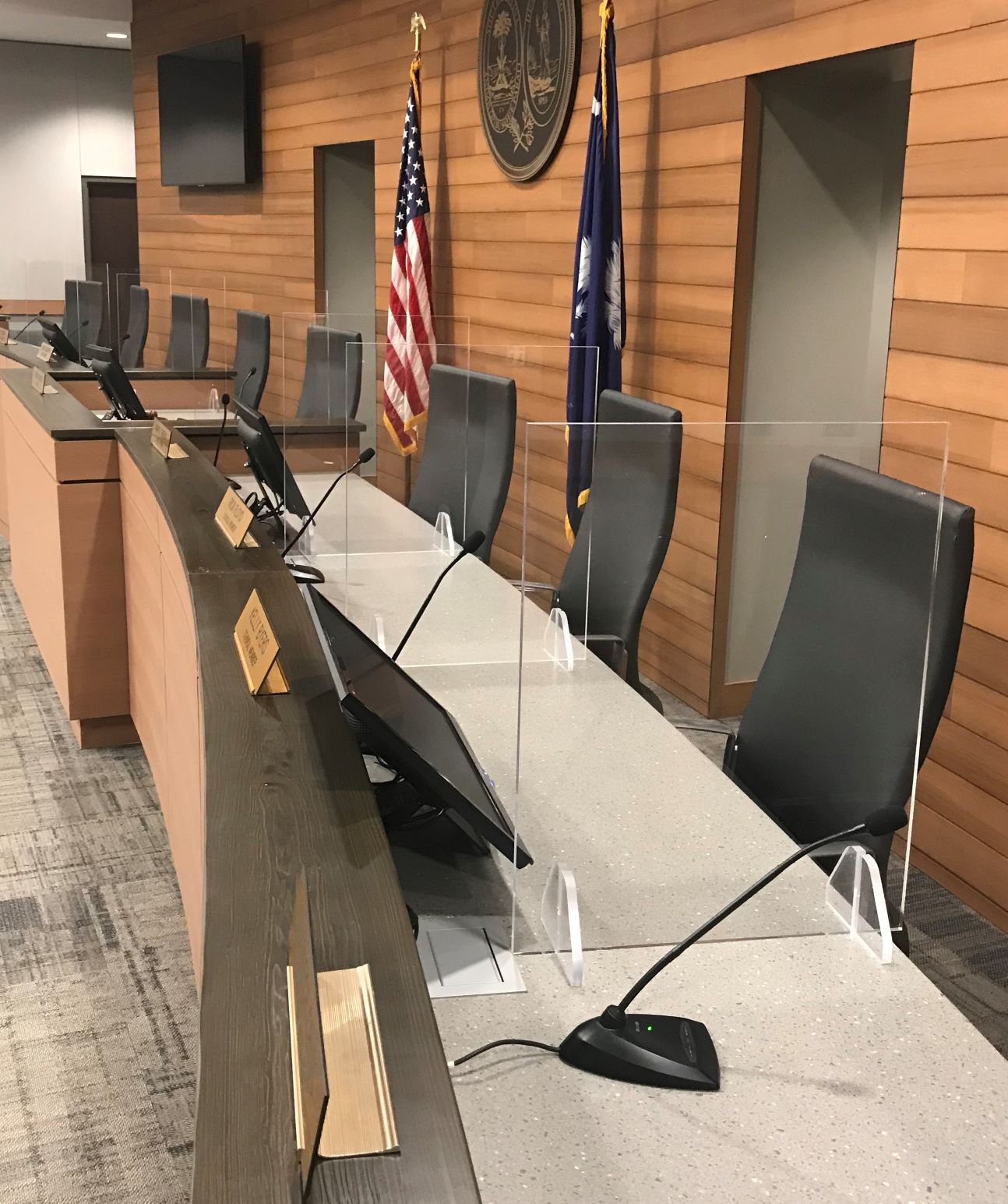This year's coronavirus disruptions and shutdowns brought difficult questions about which meetings and activities could go on hiatus. In many cases, conducting municipal business in open and transparent meetings of public bodies could not wait. As such, officials and staff moved to change the way they conducted city and town council meetings, and in some cases meetings of commissions and committees.

Bluffton councilmembers and staff gather in a virtual emergency meeting.
Photo: Town of Bluffton.
"In early March, as soon as we realized COVID-19 was going to impact our community, our state and our country, we made a quick decision to work remotely," Marc Orlando, town manager of Bluffton, said. "Town council made a quick and really good decision to call a state of emergency. That allowed for electronic meetings."
The Town of Bluffton's IT team immediately went to work, setting up and training town council members on electronic meetings and cloud-based software. The town also put a telecommuting policy and program in place, making the workplace safe for employees whose jobs required them to be in the office, and requiring employees who were able to work from home to do so.
Decisions on how to facilitate social distancing took place all over the state, as small towns and large cities turned to their IT departments for expertise. Staffers, elected officials and committee members then made a quick transition to Zoom, GoToMeeting, Facebook Live or other online meeting services.
The transition wasn't always smooth. Some days the internet connection was lagging, and people occasionally got dropped from calls.
"We're learning how to be effective as a team. I realized it was probably the smart thing to do to try to keep as much normalcy as possible. We still have weekly department head meetings. Town Council meets on the second Tuesday of the month," Orlando said.
Municipal Association of SC staff members were quick to answer questions at every juncture, Orlando said. The Municipal Association put together a videocast series, Municipal Resources for COVID-19, that addressed the best practices for electronic meetings, public comments and other considerations.

The Summerville Town Council Planning and Development Committee meets electronically.
Photo: Town of Summerville.
The Town of Summerville made most of its meetings virtual beginning in April. The public can watch through the live streaming link on the town's website, and public comments for agenda items are collected through email. People can also sign up to make comments during the meeting, according to Rebecca Vance, Summerville's town administrator.
"Council and staff have done a great job adapting to virtual meetings. We have an excellent IT department that worked diligently to make this transition a smooth process," Vance said.
Before the first virtual council meeting in April, the town staged a practice meeting online to acclimate everyone to the process. Vance noted that this helped limit the potential for technical difficulties, and it helped them to know what to expect "while we were live."

Travelers Rest set up partitions in between councilmembers' seats in preparation of in-person meetings. Photo: City of Travelers Rest.
In the upstate City of Travelers Rest, all meetings for boards, commissions and council went virtual when the pandemic hit.
"We did that for the first 60 days or so, and then we decided to do more of a hybrid after that. Council meets in chambers with an alternative seating arrangement. Everyone is at least 6 feet apart. There's modified seating for staff and council," City Administrator Eric Vinson said. "[W]e utilized Zoom and Facebook Live platforms for viewing and public participation. We are trying to facilitate a partial in-person meeting, and we're striving to improve it as we go forward."
Travelers Rest uses multiple laptops around the room to get audio and visual feeds from everyone. The public can sign up to speak at a public hearing and can communicate electronically. While the city had never streamed its meetings before the pandemic, it is now looking at purchasing equipment and cameras to improve the video feed.
"We're a small operation. It was a challenge," Vinson said. "We called around and tried to figure out how other places were doing things. And then we figured it out. A lot of research went in to try to figure out what the best solution would be. That was the biggest learning curve. Once we got it up and running, things ran very smooth on the virtual meeting."
Even though the public is not present in all council chambers around the state, cities and towns have taken steps to be sure their voices and concerns could be heard. Public hearings and agenda time for public comment continued, just in a different form.
In some communities that use the Zoom meeting platform, the public may request to enter the council "waiting room," and can voice their comments once they are admitted to a meeting or hearing. Other towns accept comments through Facebook or email.
In Bluffton, community members can submit comments two hours before the scheduled meeting and the town clerk pulls those together and reads them aloud during the meeting.
"We've had comments about face masks, about the budget, about growth management, about the way the council is handling the pandemic. We've remained in a very open dialogue with the community. We have a really great social media team and communications team," Orlando said. "Communication is key, and we've maintained that through technology. Now, more than ever, we have to respond and we have to even overcommunicate."
Along with figuring out how to hold virtual meetings, the pandemic has also pushed cities to rethink some other practices.
Orlando said Bluffton realized it was behind in its technology delivery for customers – something it has pledged to improve.
"Since we came home in March, our IT department has focused on improving our applications system so we can be 100% electronic. Before this we were about 30% in the amount of applications that could be filled out online rather than in person. We're not there yet, we've still got a little way to go with some business licensing, but we will be 100% online," he said. "In the past, we couldn't accept electronic payments on some permits and other things. We've removed those barriers through hard work by great people."
And municipalities agree that dealing with the fallout from COVID-19 has been a learning experience for everyone involved.
"The pandemic abruptly forced us to adjust the way we operate so it's important for everyone to communicate department changes," Summerville's Rebecca Vance said. Some of us have never logged into a Zoom meeting before all of this started. Everyone learns differently so it's important to be patient as people are expected to learn a new software program so quickly. We're in a time where communication, patience and teamwork are more crucial than ever."
